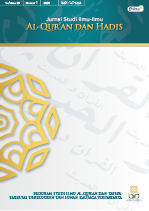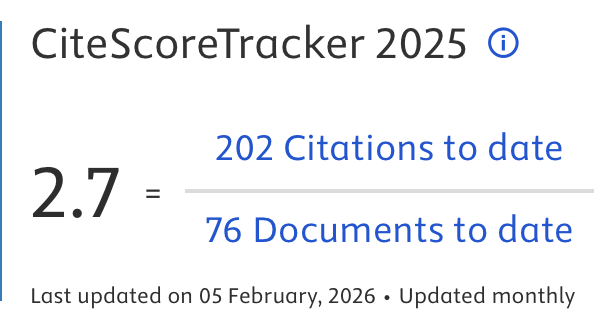Ailal Rashid's Critical Contribution to Sahih Al-Bukhari in the book of Sahih Al-Bukhari Nihayah Usturah
DOI:
https://doi.org/10.14421/qh.2022.2301-01Keywords:
Imam Bukhari, Sahih al-Bukhari, Rashid Ailal, Nihayah UsturahAbstract
This study aims to reaffirm that in the hadith literature, all scholars declare that Sahih al-Bukhari is the most authentic book after the Qur’an. Likewise, Ulamas have also praised the intellectuality of Imam Bukhari and Sahih al-Bukhari with its perfection in re-recording the words of the Prophet, both in terms of the sanad and matan. The high reputation of Sahih al-Bukhari seems to be under debate among scholars after many thinkers criticized Sahih al-Bukhari. One of the critics is Rashid Ailal who wrote Sahih al-Bukhari Nihayah Usturah. This study used a text analysis approach, namely reading people’s thoughts through the text, which was then concluded and interpreted as research findings. The method of this study was library research, namely collecting data from books, notes, and related research reports. This study shows that Rashid Ailal’s criticism of Imam Bukhari is that Imam Bukhari is just an ordinary human being who can be right and wrong. Furthermore, according to Rasyid Ailal, the codification of hadith and the instrument of ulum al-hadith which have been used as a means of selecting hadith transmitters are a tragedy. The method is not suitable to serve as the legitimacy of hadith. According to Rashid Ailal, Sahih al-Bukhari is a book of tales. He added that Imam Bukhari is a person who is majruh (flawed), and matruk al-hadith (the transmission of the hadiths is not valid) because the transmission is only based on assumptions. In Rasyid Ailal’s opinion, the existence of the author of Sahih al-Bukhari is still majhul (unknown), so the existence and credibility of Sahih al-Bukhari are questioned.
References
Ailal, Rasyid, Sahih al-Bukhari nihayah usturah, Tunis: Soutumedias, 2018.
Azami, M.M, Studies in Hadith Methodology and Literature, Washington: Aindianapolis, 1977.
Al-Salih, Subhi, Ulum al-Hadits wa mustalahuhu, Bairut: Dar al-iilm. 1988
Al-Qattan, Manna’, Mabahis fi Ulum al-Hadits, Kairo: Maktabah Wahbah, 2004
Al-Suyuti, Tadrib al-rawi,Kairo : Al-maktabah al-taufiqiyyah, tt
Al-Siba’i, Mustafa, Al-sunnah wa makanatuha fi al-tasyri’, Kairo: Dar al-salam, 2014
Al-Siraj, Sabir, Al-sahihani Sahih al-Bukhari wa Sahih Muslim, Tunis: al-Syirkah al-Tunisiyyah, 2014
Al-Salah, Ibn, Kitab Ulum al-Hadits, Tunis: Dar al-Maaif, tt
Al-Qabanji, Ahmad, Tahzib aHadits al-Syi’ah, Tunis: Mansurat al-jamal, 2009
Al-As’ad, Tariq As’ad Hilmi, Ilm Asbab al- Wurud al-Hadits, Beirut: Dar Ibn Hazm, 2001
Al-Hasani, Al-Maliki, Alwi Ibn Muhammad, Al-qawa’id al-asasiyyah, ttp : Sahar, 1399 H
Abdullah, Muhammad Husein, Dirasat fi Al-fikr al-Islami, Amman: Maktabah al-wataniyyah, 1990
Ali, Maulana Muhammad, Islamologi (Dinul Islam), Jakarta: Darul Kutubil Islamiyah, tt.
Amin, M. Z.M.Zohdi, Tazul Islam, Siti Abas, Mohd Yusuf Ismail, A. Irwan Santeri Doll Kawaid, Adnan Mohamed Yusoff, Mesbahul Hoque Chowdhury, et al. “Religio-Scientific Integration of Knowledge: A Study of Islam’s Prophetic Traditions Related to the Medical Sciences.” Advanced Science Letters 23, no. 5, 2017.
Buajilah, Fathi, Qadaya al-Hadits al-Nabawi fi fikr Muhammad al-Tahir Ibn Asyur, Tunis: Dar li al-sahr, 2014
Harrag, Fouzi, Eyas El-Qawasmeh, and Abdul Malik Salman Al-Salman. “Extracting Named Entities from Prophetic Narration Texts (Hadith).” In Communications in Computer and Information Science. Vol. 180 CCIS, 2011.
Hamzah, Muhammad, al-Hadits al-Nabawi wa makanatuhu fi al-fikr al-Islami al-Hadits, Tunis: al-markaz al-al-Saqafi, 2005.
Hasan, Ali Muttaleb, Taha H. Rassem, and M. N. Noorhuzaimi Karimah. “Combined Support Vector Machine and Pattern Matching for Arabic Islamic Hadith Question Classification System.” In Advances in Intelligent Systems and Computing. Vol. 843, 2019.
Hasan, Farid, Telaah Kritis atas Pemikiran Zakaria Ouzon, Millati, Journal of Islamic Studies and Humanities, Volume, 1 No, 2 Desember 2016.
Ismail, Syuhudi, Kaedah Kesahihan Sanad Hadits, Telaah Kritis dan Tinjauan dengan Pendekatan Ilmu Sejarah, Jakarta: Bulan Bintang 1995.
Jamal, Ikmal Hafiz, Juliyana Junaidi, Norzulaili Mohd Ghazali, Robiatul Adawiyah Mohd, Noor Azma Mohammad Khassim, Norhasnira Ibrahim, Syed Najihuddin Syed Hassan, et al. “Classification of Hadith Fi’li in Sahih Al-Bukhari Based on Contextual Understanding on the Pillars of Islam.” Advanced Science Letters 23, no. 5, 2017.
Juynboll, G.HA, Kontroversi Hadits di Mesir, ter. Ilyas Hasan, Bandung: Mizan, 1999.
Khalid, Rida, Nahwa Ufuq Islami, Tunis: Dar al-janub, 2012.
Maraoui, Hajer, Kais Haddar, and Laurent Romary. “Encoding Prototype of Al-Hadith Al-Shareef in TEI.” In Communications in Computer and Information Science. Vol. 782, 2018.
———. “Segmentation Tool for Hadith Corpus to Generate TEI Encoding.” In Advances in Intelligent Systems and Computing. Vol. 845, 2019.
Muhammad, Yahya, Musykilah al-Hadits, Tunis: Al-intisar al-Arabi, 2007.
Mahfudh, Hasan, Hemeneutika Hadits Zakariya Ouzon, Mutawatir : Jurnal Keilmuan Tafsir Hadits, Volume 4 Nomor 2 Desember 2014
Malik, al-Imam, al-muwatta’Bairut : Maktabah al-maarif, 2013
Ozon, Zakariya, Jinayah al-Bukhari, Bairut : Riad El-Rayyes, 2004
Qarnis, Ibn, Al-Hadits wa al-Qur’an, Bairut : Mnsurat al-jamal, 2011
Rosou, al-Hadi, Tarikh al-Hadits al-Nabawi Fi Tunis, Tunis: Dar Sahnun, 2014
Saleh, Nabil. “The Role of Intention (Niyya) under Saudi Arabian Hanbali Law.” Arab Law Quarterly 23, no. 3, 2009.
Sayadi, Wajidi, Elmansyah, Zaenuddin H. Prasojo, and Ahmad Muaffaq. “Theology of Jiḥād Based on the Ḥadīth: Ṣaḥīh Bukhāri’s Perspective.” HTS Teologiese Studies / Theological Studies 76, no. 4, 2020.
Syahbah, Muhammad, Muhammad, Fi Rihab Al-sunna al-kutub al-sihhah al-sittah, ttp : ttp, 1969.
Syahrur, Muhammad, Al-Islam Al-asl Wa Al-surah, UK: Tuwa Media, 2014.
Ya’kub, Ali Mustafa, Kritik Hadits. Jakarta: Pustaka Firdaus, 2011.
Zuwaib, Hamadi, Al-sunnah bain al-al-usul wa la-tarikh, Tunis: al-markaz al-saqafi, 2013.
Zahwu, Muhammad Abu, al-Hadits wa al-muhaddisun, Beirut: Dar l-kitab al-Arabi, 1983
Downloads
Published
Issue
Section
License
Publishing your paper with Jurnal Studi Ilmu-ilmu al-Qur'an dan Hadis means that the author or authors retain the copyright in the paper. Jurnal Studi Ilmu-ilmu al-Qur'an dan Hadis uses license CC-BY-NC-ND or an equivalent license as the optimal license for the publication, distribution, use, and reuse of scholarly works. This license permits anyone to copy and redistribute the material in any medium or format and must give appropriate credit, provide a link to the license, and indicate if changes were made. If you remix, translate, transform or build upon the material you may use it for private use only and not for distribution. Jurnal Studi Ilmu-ilmu al-Qur'an dan Hadis granted an exclusive non-commercial reuse license by the author(s), but the author(s) are able to put the paper onto a website, distribute it to colleagues, give it to students, use it in your thesis, etc, so long as the use is not directed at a commercial advantage or toward private monetary gain. The author(s) can reuse the figures and tables and other information contained in their paper published by Jurnal Studi Ilmu-ilmu al-Qur'an dan Hadis in future papers or work without having to ask anyone for permission, provided that the figures, tables, or other information that is included in the new paper or work properly references the published paper as the source of the figures, tables or other information, and the new paper or work is not direct at a private monetary gain or commercial advantage.
Jurnal Studi Ilmu-ilmu al-Qur'an dan Hadis journal Open Acces articles are distrubuted under the Creative Commons Attribution-NonCommercial-NoDerivatives 4.0 International (CC BY-NC-ND 4.0). Article can be read, copy and redistribute the material ini any medium or format under the following conditions:
Attribution — You must give appropriate credit, provide a link to the license, and indicate if changes were made. You may do so in any reasonable manner, but not in any way that suggests the licensor endorses you or your use.
NonCommercial — You may not use the material for commercial purposes.
NoDerivatives — If you remix, transform, or build upon the material, you may not distribute the modified material.











